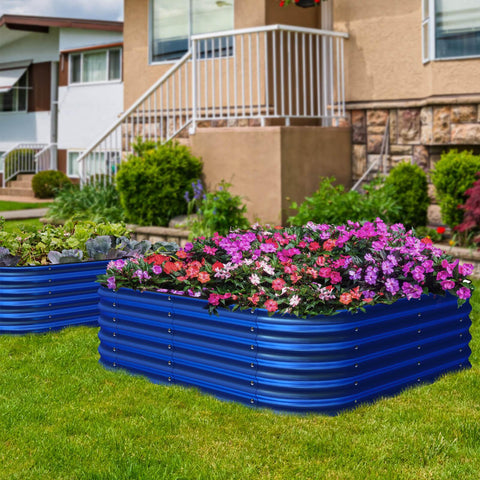Knowledge from Olle Garden Bed:More Herbs, Less Salt Day
In a world where fast food chains and processed snacks dominate our diets, it's crucial to take a step back and consider the impact of our food choices on our health. In this blog from Olle garden beds, we'll delve into the significance of More Herbs, Less Salt Day and explore some delicious ways to reduce our sodium intake while enhancing flavor.
The Health Conundrum: Too Much Salt
Salt is undoubtedly a staple in many households, but it can be a double-edged sword when consumed in excess. The sodium found in salt is an essential nutrient that plays a role in regulating bodily functions like blood pressure and fluid balance. However, most of us consume far more salt than our bodies actually need. High sodium intake has been linked to various health issues, including hypertension (high blood pressure), heart disease, stroke, and kidney problems.
More Herbs, Less Salt Day: A Healthy Alternative
More Herbs, Less Salt Day encourages us to reduce our reliance on salt for flavoring our food and instead turn to herbs and spices. This shift not only enhances the taste of our meals but also provides several health benefits:
Reduced Sodium Intake: Herbs and spices add depth and complexity to dishes without relying on salt. By using them liberally, you can significantly reduce your daily sodium intake.
Increased Nutrient Intake: Many herbs and spices are packed with vitamins, minerals, and antioxidants that can boost your overall health.
Enhanced Flavor: Experimenting with herbs and spices can lead to exciting culinary discoveries. Your palate will appreciate the variety!
Healthier Heart: Lowering your salt intake can help reduce the risk of heart disease, a leading cause of death worldwide.

Exploring the World of Herbs and Spices
Here are some popular herbs and spices that you can incorporate into your cooking to celebrate More Herbs, Less Salt Day:
Let's explore some herb options to elevate your garden's charm and functionality.
Basil (Ocimum basilicum):
Sun Requirements: Full sun (6-8 hours per day)
Growing Tips: Basil thrives in well-drained soil and requires regular pruning to encourage bushier growth.
Uses: Perfect for pasta sauces, salads, pesto, and garnishes.
Mint (Mentha spp.):
Sun Requirements: Partial to full sun
Growing Tips: Mint is a vigorous grower and can become invasive, so it's best planted in a confined space or container.
Uses: Great for teas, cocktails, and desserts.
Rosemary (Rosmarinus officinalis):
Sun Requirements: Full sun
Growing Tips: Rosemary prefers well-drained soil and is drought-tolerant once established.
Uses: Adds flavor to roasted meats, vegetables, and marinades.
Thyme (Thymus vulgaris):
Sun Requirements: Full sun
Growing Tips: Thyme is a low-maintenance herb that tolerates drought well.
Uses: Enhances the flavor of soups, stews, and roasted dishes.
Parsley (Petroselinum crispum):
Sun Requirements: Partial to full sun
Growing Tips: Parsley prefers consistently moist soil and can be grown from seeds or transplants.
Uses: Adds freshness to salads, sauces, and garnishes.
Chives (Allium schoenoprasum):
Sun Requirements: Full sun to partial shade
Growing Tips: Chives are easy to grow and benefit from regular snipping to encourage new growth.
Uses: Wonderful in potato dishes, soups, and as a garnish.
Cilantro (Coriandrum sativum):
Sun Requirements: Partial sun to light shade
Growing Tips: Cilantro bolts quickly in hot weather, so succession planting can help ensure a steady supply.
Uses: Essential in Mexican and Asian cuisine.
Lavender (Lavandula spp.):
Sun Requirements: Full sun
Growing Tips: Well-drained soil is essential for lavender; it also adds a lovely aroma to your garden.
Uses: Ideal for teas, baking, and potpourri.
Oregano (Origanum vulgare):
Sun Requirements: Full sun
Growing Tips: Oregano is drought-tolerant and benefits from regular pruning.
Uses: Enhances the flavor of pizzas, pasta sauces, and Mediterranean dishes.
Dill (Anethum graveolens):
Sun Requirements: Full sun
Growing Tips: Dill attracts beneficial insects and can reseed itself if allowed.
Uses: Complements fish, pickles, and salads.

Simple Ways to Incorporate More Herbs and Less Salt
Experiment: Don't be afraid to try new herbs and spices in your cooking. Discover your favorite combinations by mixing and matching.
Fresh Herbs: Whenever possible, use fresh herbs instead of dried ones for a more vibrant flavor.
Homemade Seasonings: Create your own spice blends, like a zesty taco seasoning or a Mediterranean herb mix, to use in your recipes.
Marinating: Marinate meats and vegetables with herbs, garlic, and a splash of citrus juice for added flavor without excess salt.
Reduced-Sodium Products: When using packaged ingredients like broths or sauces, opt for low-sodium versions.
More Herbs, Less Salt Day is a reminder that small changes in our eating habits can have a big impact on our health. By embracing the world of herbs and spices, we can reduce our sodium intake without sacrificing flavor. So, this August 29th, celebrate by trying out new herb-infused recipes and embark on a flavorful journey toward a healthier you. Your heart and taste buds will appreciate it!
